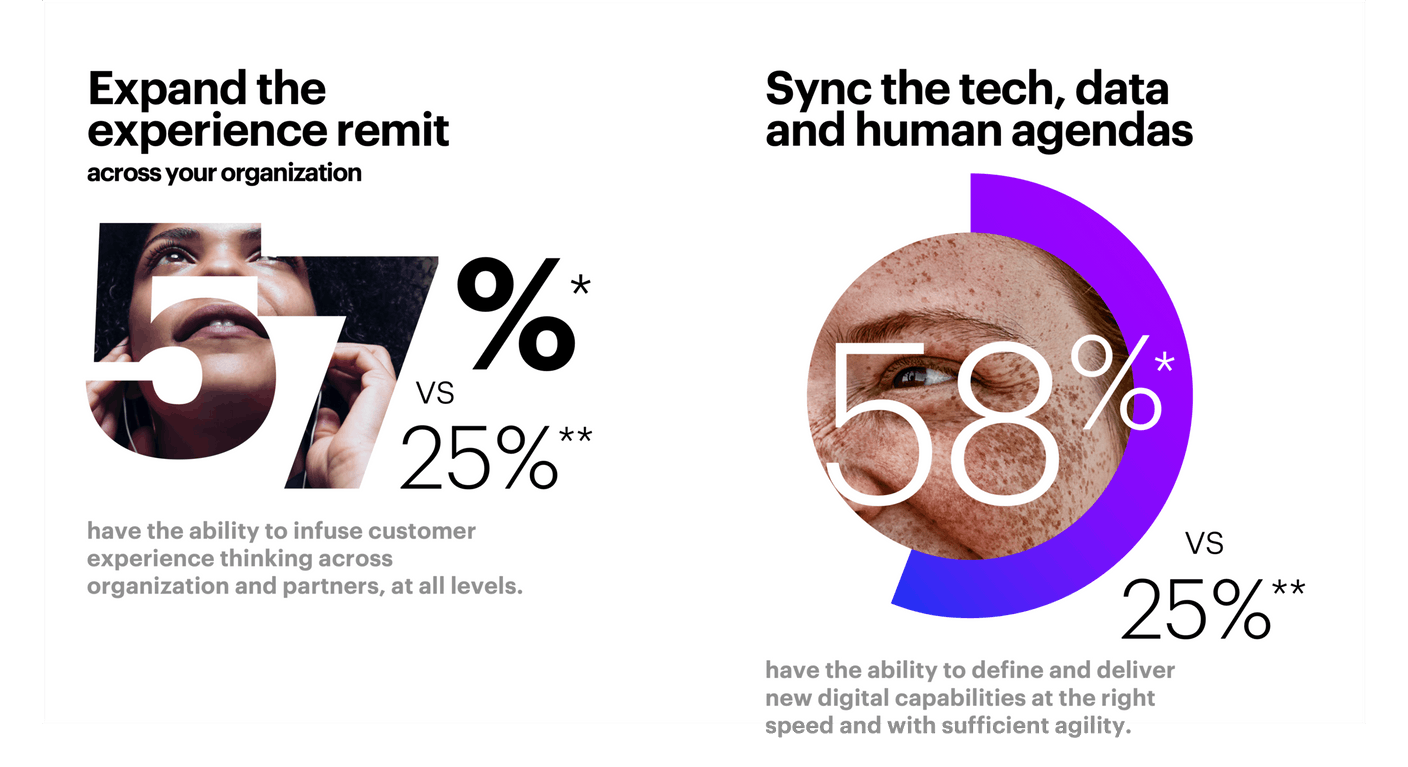In recent years, companies have focused strongly on improving customer experience. This has mainly involved optimizing touchpoints in the customer journey, with a big accent on facilitating digital interactions. This digital trend was accelerated by the global pandemic, and it’s here to stay: 80% of consumers who increased their digital usage across a variety of channels during the pandemic expect to sustain these levels moving forward.
Sea of sameness
Investments in an omnichannel journey and digital enablement have largely paid off. However, they have also created another phenomenon that we define as a “sea of sameness” – customer experience has become too homogenized, leaving little differentiation between brands. We therefore need to look beyond the idea that touchpoints are where experiences start and end. Customers bring a purpose, problem, need or question to every interaction with your brand—along with expectations on how quickly or easily the outcome will be realized.
From customer experience to business of experience
Business of experience (BX) that will help companies to differentiate themselves and reignite growth. It starts with “purpose”. The demand for purpose has been growing for several years and this has been accelerated by recent world events. Brands face intense pressure to stand for something bigger than the products and services they sell. Today, eight in 10 consumers say purpose is at least as important to them as customer experience. Accenture has identified four ways to succeed in moving towards a business of experience culture.
Business of experience (BX) is a more holistic approach that will help companies to differentiate themselves and reignite growth.
1. Obsess about customer needs—and use that as your compass.
Companies dispose of large pools of data that are often underutilized and dispersed across different tools and between different departments. Consolidating this data will allow companies to understand and fulfill the unmet needs of customers. This in turn can help establish the purpose of the company that will serve as a compass for strategic decisions.
2. Make experience innovation an everyday habit.
Experience innovation is about solving problems in fundamentally new ways. Experience innovation means going beyond the simple look and feel of new digital tools towards understanding and re-imagining the organization itself and the processes that help consumers achieve their desired outcomes. This is something Accenture does every day with its clients in the Luxembourg Liquid Studio. Every opportunity – internal and external – should be seized upon to question the status quo and push for innovation.
3. Expand the experience remit across your organization.
Each and every employee contributes to a great customer experience. It is not solely the responsibility of marketing or sales teams. It is therefore crucial that experience innovation becomes part of company culture and an everyday habit for all. First, this means fusing departments across the company to break (largely inefficient) silos. Second, all employees should receive coaching on the importance of a customer-obsessed culture and the role they play in the overall customer journey. Third and last, empowering employees and pushing the decision-making process related to experience down in the organization will create a feeling of ownership.
4. Sync the tech, data, and human agendas.
74% of companies say they plan to completely rethink their processes and operating models to become more resilient and more oriented towards experience. This is not about investing more, but investing differently. It means using IT investments, data and human talent to create one customer journey together. Taking a holistic view and finding areas of synergy and connectivity will help companies maximize all returns.
Taking a holistic view and finding areas of synergy and connectivity will help companies maximize all returns.
What does business of experience mean for the wealth management industry?
Today’s investors also seek purpose and want to understand the impact of their investments. Investors’ expectations of their experience with private banks are also changing and the gap between expectations and actual service experience is widening. Wealth managers need to re-think the customer journey they offer by pivoting towards the business of experience, leveraging innovation through progressive digitalization, personalization, and data-enabled business models that place the client at the center of the value proposition.
Accenture Retail COVID-19 Consumer research, August 2020.https://www.accenture.com/us-en/insights/retail/coronavirus-consumer-habits
Accenture Global Consumer Pulse Research, February 2020. https://www.accenture.com/_acnmedia/PDF-117/Accenture-Generation-P-urpose-PoV.pdf#zoom=40
Accenture CXO survey, July 2020.











